Blog Content
19
Jun
2025
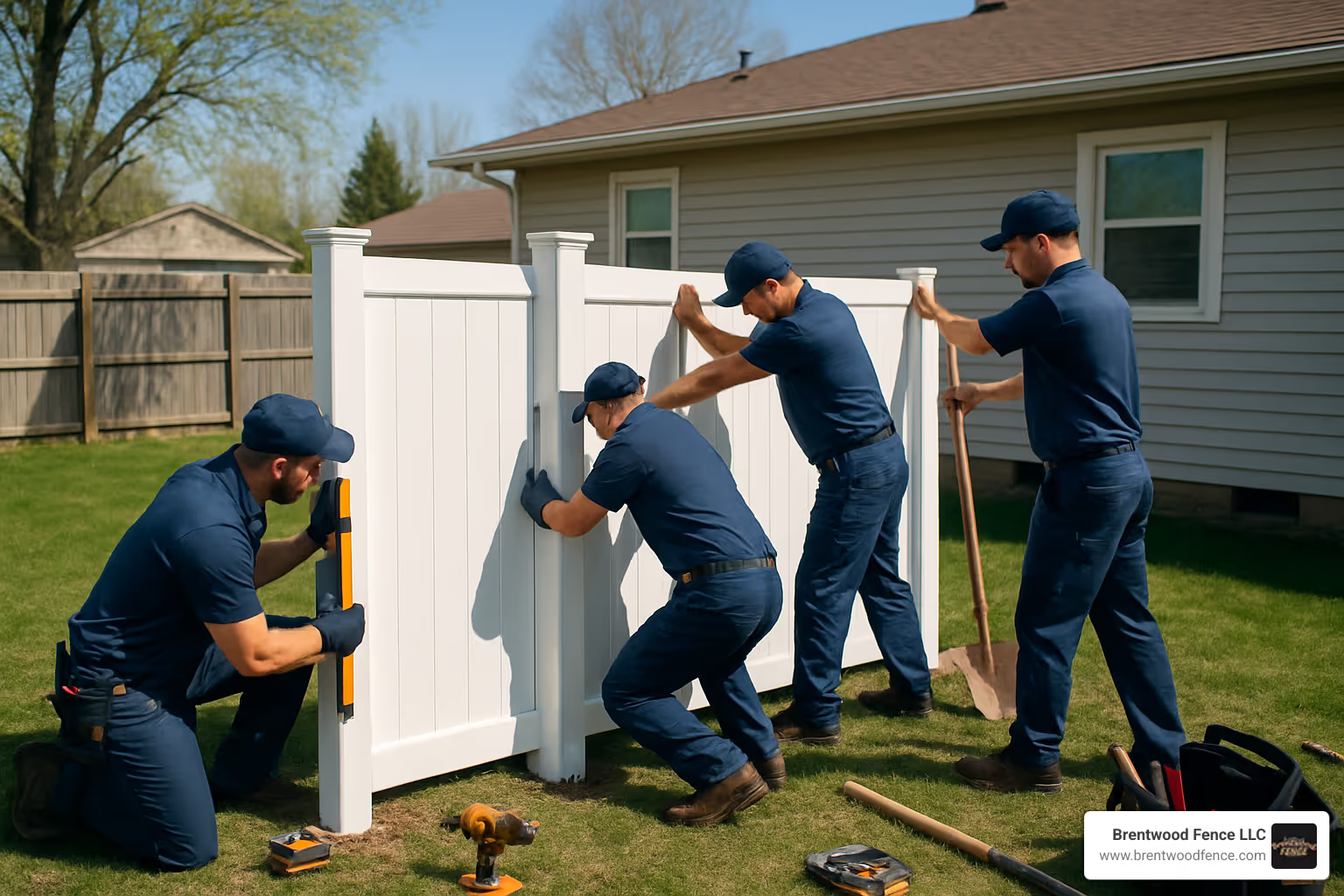
Finding the right vinyl fence installers can make the difference between a fence that lasts decades and one that becomes a costly headache. With vinyl fencing lasting 20-30 years compared to wood's 5-10 year lifespan, professional installation ensures you get the full return on your investment.
Top qualities to look for in vinyl fence installers:
The best NH vinyl fence installers understand that proper installation is critical. Unlike wood fencing that can be adjusted over time, vinyl requires precise measurements and professional techniques from day one. Poor installation leads to sagging gates, uneven panels, and voided warranties.
As one satisfied customer noted: "Rob and all members of the team were excellent to work with. We chose a white vinyl fence and gate. We needed it to meet NH pool enclosure laws, and they were knowledgeable about that. This is a very professional and caring company." This level of professionalism separates quality installers from the rest.
Professional installation typically costs 50-70% of your total project budget, but it's worth every penny. Expert installers handle permits, utility marking, proper post depth (one-third the fence height plus 6 inches), and ensure panels expand and contract correctly with temperature changes.
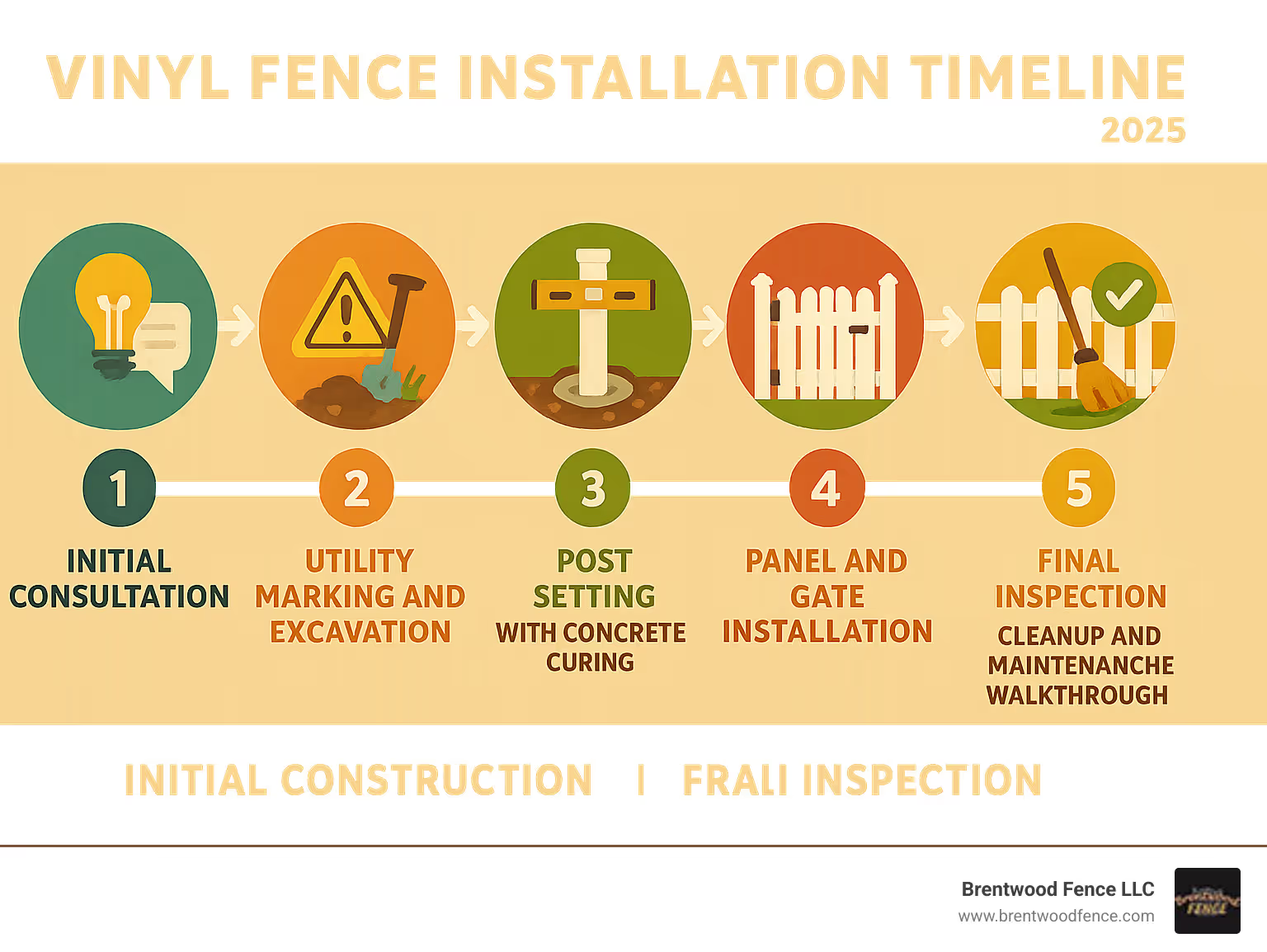
There's a quiet revolution happening in backyards across New Hampshire, Massachusetts, and Maine. Homeowners are finding what professional vinyl fence installers have known for years – vinyl fencing simply outperforms every other material on the market.
The change starts with durability that puts wood and aluminum to shame. While your neighbor's wood fence shows its age after just a few seasons, vinyl fencing maintains its crisp appearance for decades. We're talking about fences that can last over 30 years when properly installed, compared to wood's typical 5-10 year lifespan before major repairs or replacement become necessary.
What makes vinyl so incredibly tough? It's engineered from virgin PVC with UV inhibitors and impact modifiers that resist the harsh New England weather. No more worrying about rot, warping, or that dreaded yellow tinge that ruins curb appeal. Professional-grade vinyl actually withstands high winds and heavy rains better than traditional materials, with wind-certified options available up to 130 MPH for coastal properties.
The maintenance story is even better. Remember spending weekends staining and sealing that wood fence every few years? Those days are over. Vinyl fencing requires no painting, staining, or sealing – ever. A simple rinse with your garden hose or an occasional wash with soap and water keeps it looking factory-fresh.
Here's where vinyl really shines: it's completely pest-proof. No termites, no carpenter ants, no boring insects that can destroy wood fencing from the inside out. You'll never deal with splinters, rust, or the gradual deterioration that makes other materials look tired and worn.
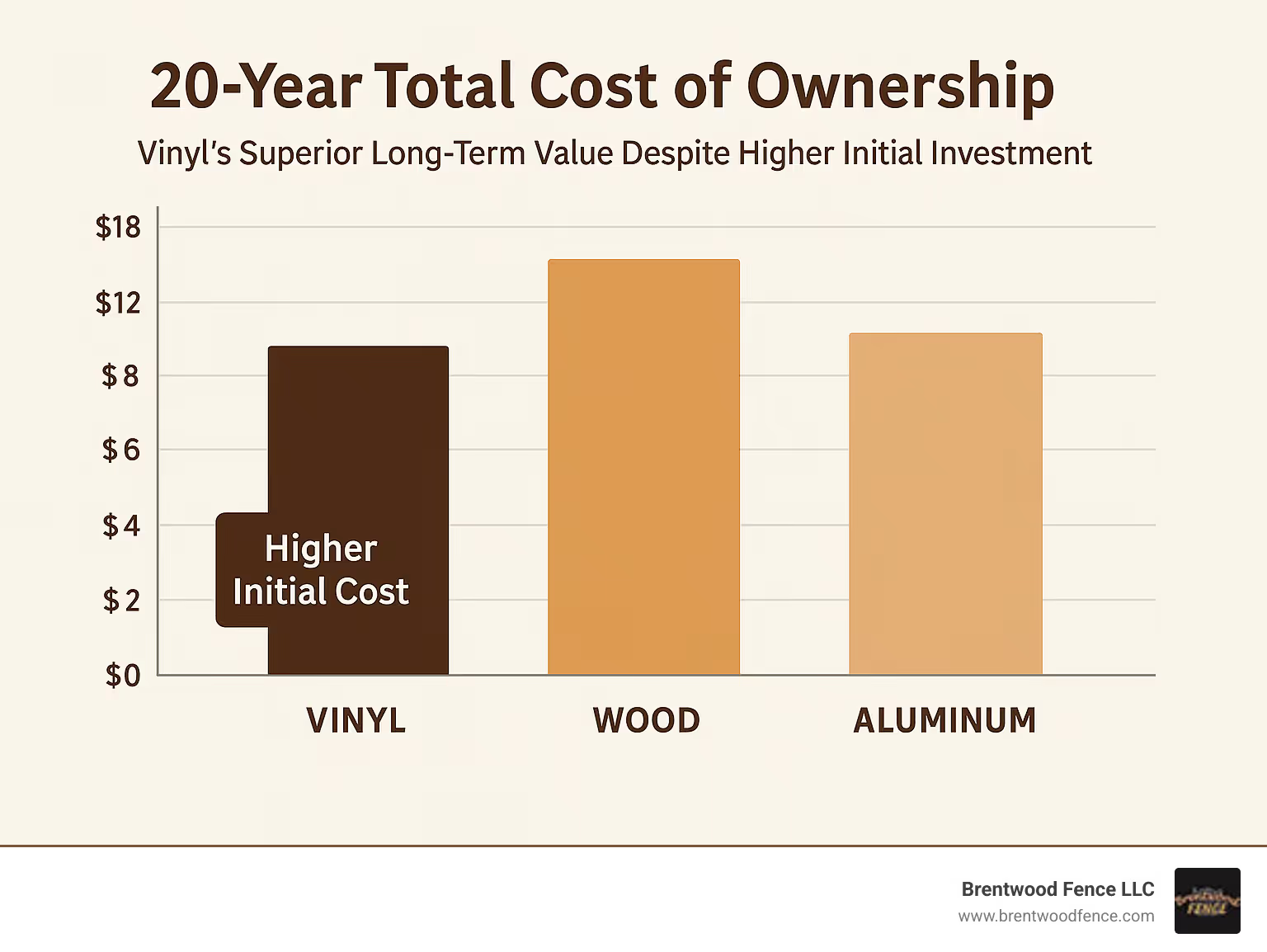
Let's talk numbers, because the cost-over-time comparison is eye-opening. Yes, vinyl fencing typically costs $15-30 per linear foot installed, while wood appears cheaper upfront. But here's what most homeowners don't calculate: wood requires staining every 2-3 years at $2-5 per linear foot, plus repairs, plus eventual complete replacement.
When you factor in vinyl's lifetime warranty and minimal maintenance over 20-30 years, the financial winner becomes crystal clear. Professional vinyl fence installers often show customers how vinyl pays for itself through avoided maintenance costs alone.
There's also the environmental angle that appeals to eco-conscious homeowners. Vinyl fencing doesn't require cutting down trees, and unlike treated lumber, it won't leach chemicals into your soil or groundwater. It's a choice you can feel good about for both your family and the environment.
The switch to vinyl isn't just about practicality – it's about peace of mind. When professional installers set your vinyl fence correctly, you're essentially done worrying about your property boundary for decades to come.
For more details about our Vinyl Fencing options and styles, we'd love to show you exactly why so many of your neighbors are making the switch to vinyl.
Finding trustworthy vinyl fence installers shouldn't feel like searching for a needle in a haystack, but unfortunately, it sometimes does. We've heard too many stories from homeowners who got burned by contractors who talked a good game but delivered disappointing results.
The good news? With the right approach, you can easily separate the professionals from the pretenders.
Start with the basics: licensing and insurance. Every reputable installer should carry general liability insurance and workers' compensation coverage. In New Hampshire, Massachusetts, and Maine, contractors working on larger projects need proper licensing. Don't be shy about asking to see current certificates - legitimate contractors expect this question.
Experience matters tremendously with vinyl fencing. While your neighbor's handyman might be great with wood decks, vinyl installation requires specific knowledge. The material expands and contracts differently than wood, uses specialized hardware, and demands precise measurements from the start. Look for installers with at least 5 years of vinyl-specific experience and ask to see their recent project portfolio.
Here's something many homeowners overlook: local code knowledge. Professional vinyl fence installers understand zoning requirements, setback rules, and permit processes inside and out. They should handle permit applications for you and ensure your fence meets all municipal requirements. This expertise prevents headaches and expensive mistakes later.
Quality installers also stand behind their work with written labor warranties, typically ranging from 1-5 years, which complements the manufacturer's material warranty. Many offer financing plans too, making your dream fence more budget-friendly.
For homeowners in our region, our guide on Local NH, MA & ME Vinyl Fence Installers covers important area-specific considerations worth reviewing.
The right questions can reveal everything you need to know about potential vinyl fence installers. Think of this as your interview process - after all, you're hiring them for a significant investment.
Start with their experience and expertise. How many years have they specialized in vinyl fence installation specifically? Can they provide references from recent vinyl projects? What's their typical crew size for a project like yours? Do they handle permits and inspections, or will you be left scrambling to figure that out yourself?
Dig into their materials and methods. Ask about the grade of vinyl they use - virgin PVC performs much better than recycled materials. How do they ensure proper post depth and concrete curing? What's their cleanup policy? A professional installer should provide a written warranty on their labor.
Get clear on project management details. What's their typical timeline from start to finish? How do they handle weather delays (because let's face it, New England weather has its own agenda)? What's their payment schedule? Red flag: anyone demanding full payment upfront. Do they carry current liability insurance and workers' compensation?
The best installers welcome these questions and answer them confidently and thoroughly. If someone seems evasive or pressures you to sign immediately, trust your gut and keep looking. One common question homeowners ask relates to fence height - you might find this discussion on Should a fence touch the ground? helpful for understanding proper installation techniques.
Some warning signs should immediately disqualify vinyl fence installers from your consideration list. We've seen too many homeowners learn these lessons the hard way.
Documentation red flags include refusing to provide written estimates, being unwilling to show insurance certificates, having no local business address, or pressuring you to sign contracts on the spot. Legitimate businesses operate transparently.
Business practice concerns are equally telling. Be wary of door-to-door solicitors claiming they have "leftover materials" from another job, contractors demanding full payment upfront, anyone who can't provide local references, or installers who communicate poorly or appear unprofessional.
Technical warning signs reveal inexperience or corner-cutting tendencies. If an installer doesn't mention permits or local codes, can't explain proper post-setting techniques, offers prices significantly below other estimates, or provides no warranty on labor, keep looking.
Trust your instincts here. If something feels off during your interactions, it probably is. Professional contractors understand that a fence installation is a major investment and treat the process accordingly.
When evaluating quotes from different installers, resist the temptation to focus solely on the bottom line number. A comprehensive quote should break down costs clearly, showing linear foot pricing for fencing, individual gate costs and hardware, post-setting and concrete work, permit fees, and cleanup services.
Several factors affect your total investment. Fence height makes a significant difference - 6-foot privacy fencing costs more than 4-foot picket styles. Terrain challenges like slopes and obstacles increase labor costs. Each gate typically adds $200-500 to the project, depending on size and hardware. Design complexity with decorative elements increases material costs, and seasonal timing matters too - spring and fall are peak seasons with higher rates.
Many homeowners appreciate financing options for larger projects. Look for competitive interest rates (often better than credit cards), flexible payment terms, no prepayment penalties, and quick approval processes. Seasonal discounts sometimes become available during slower winter months.
For a detailed estimate customized to your specific property and needs, we invite you to request our Free Fencing Installation Estimate. This helps you understand exactly what your project will involve and cost.
Understanding the professional vinyl fence installation process helps you know what to expect and ensures quality results. Here's how experienced vinyl fence installers approach your project:
Phase 1: Site Assessment and Preparation
The process begins with precise property measurement and layout marking. Professional installers verify property lines, identify underground utilities, and plan gate locations. They call 811 for utility marking - a critical safety step that prevents costly accidents.
Phase 2: Permits and Planning
Quality installers handle permit applications and ensure compliance with local codes. This includes setback requirements, height restrictions, and any homeowner association guidelines. The permit process typically takes 1-2 weeks in most New Hampshire, Massachusetts, and Maine municipalities.
Phase 3: Excavation and Post Setting
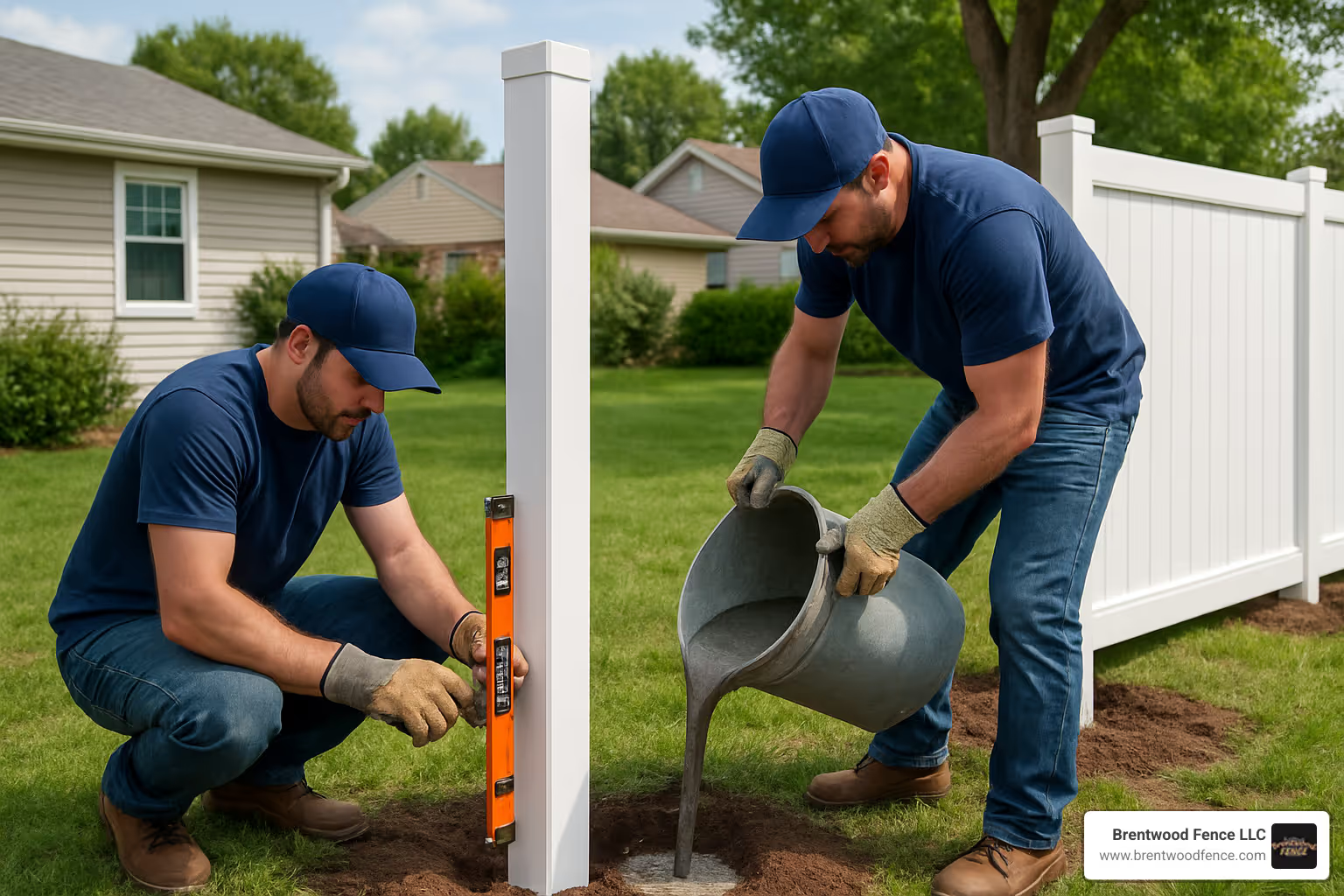
Post holes are dug to proper depth - typically one-third the fence height plus 6 inches for the gravel base. Posts are set in concrete and allowed to cure for 24-48 hours. This step is crucial for long-term stability and can't be rushed.
Phase 4: Panel and Gate Installation
Once posts are secure, rails and panels are installed with proper expansion gaps. Vinyl expands and contracts with temperature changes, so experienced installers leave small gaps every 6-8 feet. Gates receive special attention to ensure smooth operation and proper alignment.
Phase 5: Final Inspection and Cleanup
The final phase includes testing all gates, cleaning the work area, and conducting a walkthrough with the homeowner. Professional installers explain maintenance requirements and provide warranty documentation.
Our Vinyl Fencing Installation Services follow this proven process to ensure lasting results and customer satisfaction.
Your vinyl fence should make your neighbors a little envious - in the best possible way. Today's vinyl fencing options go far beyond basic white pickets, offering styles and features that can transform your property's entire look. The best vinyl fence installers help you steer these choices to create something truly special.
Privacy panels remain the most popular choice for good reason. These solid barriers offer complete privacy while blocking noise from busy streets or chatty neighbors. Available in heights from 4 to 8 feet, they're perfect when you want to create your own backyard sanctuary.
If you prefer the charm of traditional fencing, picket styles deliver that classic American look with modern durability. The spacing between pickets lets light and air flow through while still defining your property boundaries. You can choose from pointed tops for a formal look or scalloped designs that add a touch of whimsy.
For larger properties where you want boundaries without blocking beautiful views, ranch rail fencing works perfectly. These horizontal rail systems give you that countryside feel while marking property lines clearly.
Lattice-top privacy panels offer the best of both worlds - solid privacy below with decorative lattice sections on top. It's a great way to add visual interest without sacrificing the privacy you need.
When it comes to colors, you're not stuck with basic white anymore. White remains timeless and complements any home style, but tan and beige tones create warmth and blend beautifully with natural landscapes. Gray has become incredibly popular with modern homes, offering a sophisticated look that feels fresh and contemporary.
The wood-grain textures are particularly impressive - they give you the rich appearance of natural wood without any of the maintenance headaches.
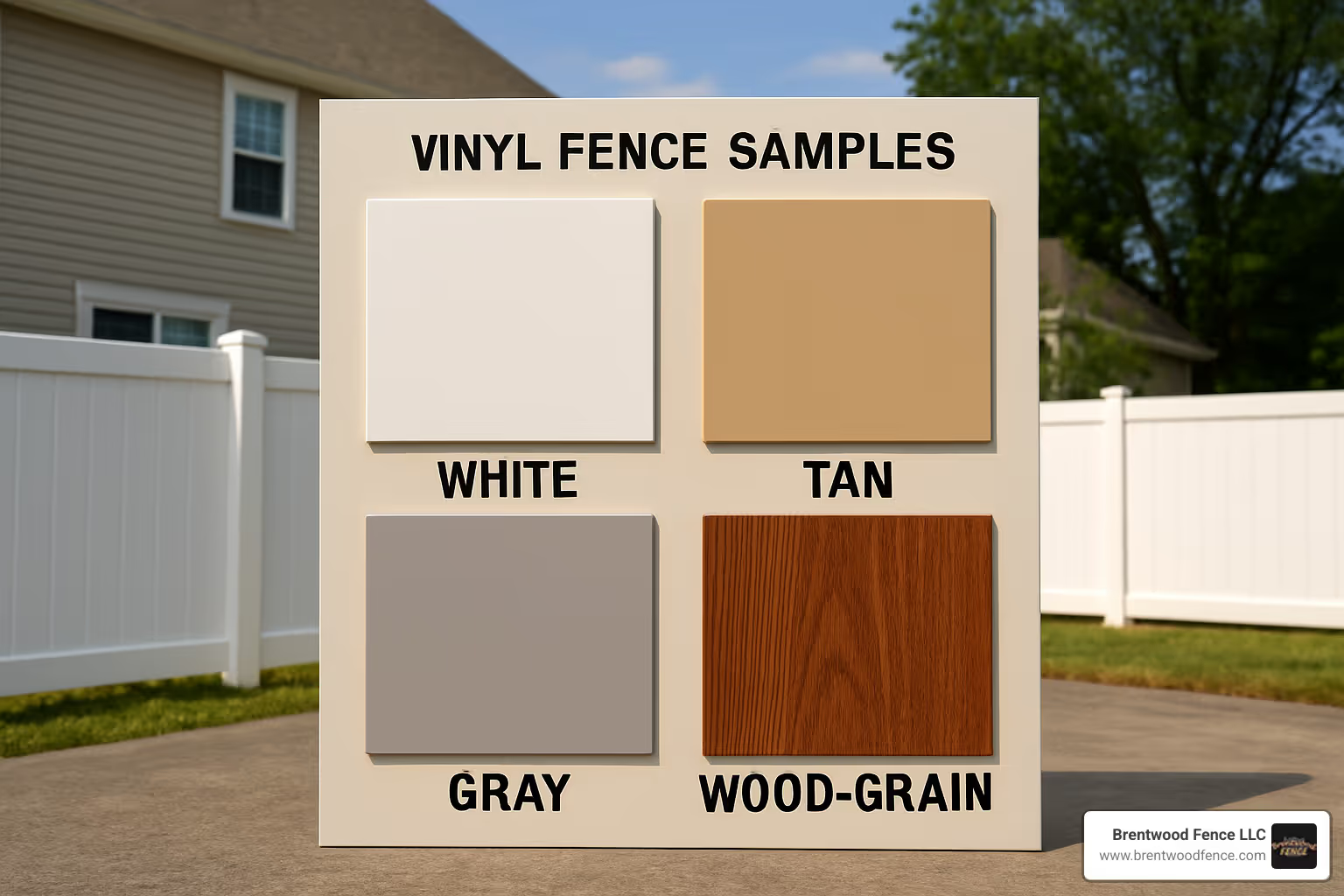
Custom features can really make your fence stand out from the neighborhood standard. Decorative post caps add personality - from simple ball tops to solar-powered lights that illuminate your property at night. Smart gate locks with keypad entry mean no more fumbling for keys when your hands are full of groceries.
If your property has slopes, stepped panels follow the terrain naturally while maintaining consistent height and appearance. Many homeowners also opt for custom heights to meet specific privacy needs or security requirements.
The key is working with experienced installers who understand how these choices affect both looks and function. What works beautifully on your neighbor's ranch-style home might not suit your colonial, and professional installers help you make choices that improve your specific property.
For detailed information about what works best in our New England climate and communities, check out our guide to Residential Fencing Options NH, MA, ME. We love helping homeowners find options they didn't know existed - and seeing their excitement when the perfect fence transforms their property.
When homeowners start researching vinyl fence installers, they often have similar questions about durability, maintenance, and costs. Let's address the most common concerns we hear from property owners in New Hampshire, Massachusetts, and Maine.
Here's the good news: a professionally installed vinyl fence typically lasts 20-30 years, with premium brands often exceeding 30 years when properly maintained. That's a remarkable lifespan that makes vinyl fencing one of the best long-term investments you can make for your property.
The secret to this impressive longevity lies in modern vinyl technology. Today's quality vinyl fencing includes UV inhibitors that prevent fading and brittleness from constant sun exposure - a crucial feature in New England's varied climate. Impact modifiers keep the material flexible during our harsh winters, while steel-reinforced rails prevent sagging and maintain structural integrity year after year.
But here's what really matters: proper installation by experienced vinyl fence installers. The 30-year average lifespan assumes professional installation with quality materials and correct techniques. We've seen DIY installations or bargain-grade vinyl fail in just 5-10 years due to improper post depth, inadequate concrete curing, or inferior materials.
Professional installers understand that vinyl fencing isn't forgiving like wood - you can't just adjust it later if something's wrong. Everything must be precise from day one, from post spacing to panel alignment.
One of vinyl fencing's biggest advantages is its incredibly low maintenance requirements. Unlike wood fencing that demands regular staining and repairs, vinyl fencing needs just basic care to look great for decades.
Your annual maintenance routine is refreshingly simple: rinse your fence with a garden hose to remove dirt and debris, clean any stubborn stains with mild soap and water, and inspect gate hardware to ensure smooth operation. That's it! Most homeowners can complete this entire process in under an hour.
What you'll never need to do with vinyl fencing makes the maintenance story even better. No painting or staining every few years. No sealing or waterproofing treatments. No termite prevention or rust removal. The material simply doesn't require these time-consuming and expensive treatments.
Occasionally, you might need to check for loose panels or posts, though this is rare with proper professional installation. The maintenance-free nature of vinyl makes it particularly attractive to busy families who want a beautiful fence without the weekend maintenance projects.
Understanding vinyl fence pricing helps you budget effectively and avoid surprises. Most vinyl fence installers price projects based on several key factors that can significantly impact your total investment.
Linear footage forms the foundation of most quotes, typically ranging from $15-30 per linear foot when professionally installed. Fence height plays a major role - a 6-foot privacy fence requires more materials and labor than a 4-foot picket fence. Terrain challenges like slopes, rocky soil, or tight access areas increase installation time and complexity.
Gate requirements add substantial cost to any project. Each gate typically adds $200-500 to your total, depending on size and hardware choices. Style complexity also affects pricing - decorative elements, custom colors, and special features increase both material and labor costs.
Regional factors specific to New Hampshire, Massachusetts, and Maine include varying labor rates depending on location and season, permit fees that range from $50-200 per municipality, and soil conditions that can make excavation more challenging in rocky New England terrain.
Smart homeowners can reduce costs by scheduling installation during off-peak seasons like winter or early spring, minimizing the number of gates where possible, and choosing standard heights and styles over custom options.
The average vinyl fence project in our region ranges from $2,500-8,000, depending on these factors. For an accurate estimate custom to your specific property and needs, the best approach is requesting a detailed quote from experienced local installers.
Finding the right vinyl fence installers doesn't have to be overwhelming when you know what to look for. After reading this guide, you're equipped with the knowledge to make a smart decision that will benefit your property for decades to come.
The investment in professional vinyl fence installation in NH, ME and MA pays dividends year after year. While you might save a few dollars going with the lowest bidder, quality installation from experienced vinyl fence installers ensures your fence will stand strong through New England's harsh winters and humid summers without warping, rotting, or requiring constant repairs.
Think about it this way - you're not just buying a fence, you're investing in peace of mind. When you choose licensed, insured professionals who stand behind their work with written warranties, you can relax knowing your investment is protected. No more weekend painting projects, no more replacing rotted boards, and no more worrying about termites or other pests.
Brentwood Fence LLC has been changing properties throughout New Hampshire, Massachusetts, and Maine with quality vinyl fence installations. Our team handles everything from the initial consultation through final cleanup, ensuring your project runs smoothly from start to finish. We take pride in our transparent pricing, professional communication, and attention to detail that keeps customers recommending us to their neighbors.
Your home's curb appeal deserves the best, and vinyl fencing delivers that perfect combination of beauty and functionality. Whether you're looking for complete privacy, improved security, or simply want to define your property boundaries, professional installation ensures you get exactly what you envision.
Ready to see what a difference quality vinyl fencing can make for your property? We'd love to discuss your project and provide a detailed estimate custom to your specific needs. Contact us today for your Free Fencing Installation Estimate and find why homeowners throughout New England trust us with their fencing projects.
Your property change is just a phone call away - and with the right vinyl fence installers, you'll be enjoying beautiful, maintenance-free fencing for years to come.
Copyright 2022 Brentwood Fence | All Rights Reserved | Sitemap | Website by Plumb Development a Digital Marketing Agency